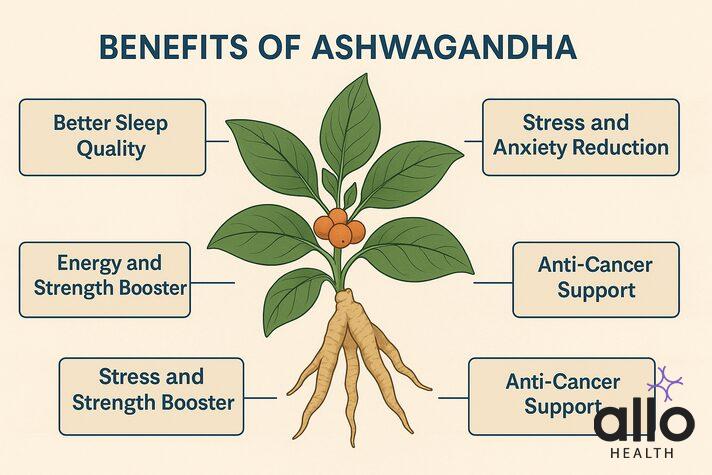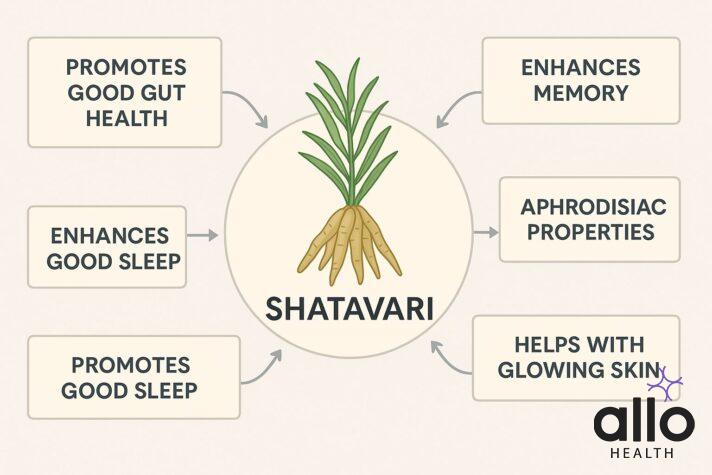Can I take Ashwagandha and Shatavari together For Better Sex Life?

Ashwagandha and Shatavari can be taken together, and this powerful Ayurvedic duo has been safely used for centuries to support stress relief, hormone balance, and sexual wellness in both men and women. From better sleep, memory, and energy to improved libido, fertility, and menstrual health, the combined benefits of Ashwagandha and Shatavari cover a wide range of physical and mental wellness goals. But like any supplement, they’re not risk-free, especially if you're pregnant, on medication, or managing a hormone-sensitive condition. While short-term use is considered safe, long-term effects still need more human-based research. If you’re planning to add them to your daily routine, whether with milk, water, or in capsule form: this guide helps you make a smart and informed start.
You’ve probably heard your elders or people around you talk about Ashwagandha and Shatavari. Maybe they used them for strength, stress, focus, or even hormonal balance. These herbs have been part of Indian homes for generations. So now you might be wondering, can I take ashwagandha and shatavari together, whether it’s for general health or sexual benefits?
The short answer is yes, you can, but with a few precautions. Ayurveda has safely used both herbs in combination for centuries, and modern studies are focusing on more research on their effects. But just like with any supplement, there are important things to keep in mind, especially if you have any health issues or are already taking medications.
In this article, we’ll look up the general and sexual benefits of Ashwagandha and Shatavari, how they work together, what potential risks they come with, and when it’s best to talk to a doctor.
What Are Ashwagandha and Shatavari?
Ashwagandha (Withania somnifera), also called Indian ginseng, is a popular Ayurvedic herb used for thousands of years. People take it to reduce stress, improve sleep, boost energy, and to balance their hormonal health. It’s considered an adaptogenic herb, which means it helps your body handle stress, anxiety, and fatigue [1].
Shatavari (Asparagus racemosus) is another well-loved Ayurvedic herb. It was traditionally used for women’s health [2]. It also supports fertility, hormone balance, and immune system in both men and women. It is also an adaptogenic herb and works to strengthen and nourish the body [3].
Both herbs have been used for ages and are still popular as go-to natural options among people who prefer natural remedies over regular medicine.

Can Ashwagandha and Shatavari Be Taken Together?
A lot of people wonder : if I start taking both ashwagandha and shatavari, will it cause any side effects? Is it safe to mix two herbs?
The short answer is yes, it’s absolutely safe to take Ashwagandha and Shatavari together for most people. This combination has been used in Ayurveda for centuries. A lot of herbal supplements include both of these herbs in one mix.
These herbs are like two friends who make a good team when working together. But like with any supplement, it’s always a good idea to take them in the right dose and talk to a healthcare professional before taking them.
General and Sexual Benefits of Ashwagandha
Ashwagandha as a powerful herb has a lot of benefits for general and reproductive health. Let us explore these benefits:
Better Sleep Quality: Ashwagandha has traditionally been used to treat insomnia and restlessness. A recent study on 150 Indian adults between 18 and 65 years old found that ashwagandha extract significantly improved multiple sleep aspects in 72% of subjects. These aspects included
- sleep efficiency
- total sleep time
- reduced time to sleep [4]
Stress and Anxiety Reduction: Ashwagandha is a natural adaptogen, meaning it helps the body manage stress. Several studies have shown that ashwagandha significantly lowers stress hormones like cortisol, the body’s main stress hormone [1]. These benefits were noticeable when these herbs were taken at a dose of 600 mg per day over a minimum of 8 weeks [4].
Energy and Strength Booster: Ashwagandha is not just about calming the body, but it also supports physical strength. A clinical study involving young men over 8 weeks showed that those who took Ashwagandha saw better muscle growth, strength, and recovery during resistance training. This makes it popular among athletes and fitness enthusiasts [5].
Anti-Cancer Support: Ashwagandha has shown powerful anti-cancer and immune-boosting effects. It has not only shown slowing down the growth of cancer cells but has also helped reduce side effects of chemotherapy and radiation. Daily intake of ashwagandha powder (3–6 g) was linked with improved energy, reduced toxicity, and better weight maintenance in cancer patients [6].

General and Sexual Benefits of Shatavari
Now that the benefits of Ashwagandha are clear, let us now know the benefits of Shatavari for both general and sexual health. Shatavari is also known as the “queen of herbs” [2]
- Promotes good gut health: Shatavari has been used to promote gastric emptying. Oral administration of powdered dried root of Shatavari has been found to help with stomach and intestinal issues, showing results comparable to some modern medicines [2].
- Enhances memory: Shatavari supports learning and brain function, especially during physical or mental stress. It has been historically used by students and working professionals to support learning and cognitive health [7].
- Promotes good sleep: Shatavari helps to produce serotonin and GABA neurotransmitters in the brain that work as natural hormones for stress reduction. Research shows that it helps lower cortisol levels, stress and anxiety, enhance mood, improve mental focus, encourage cognitive function and reduce the risk of depression.
- Helps with glowing skin: Shatavari contains more than 50 bioactive compounds that fight oxidative stress, slow signs of aging, boost collagen, and help manage skin and hair issues like acne, hair fall, and rashes [8].
- Aphrodisiac properties: Shatavari’s name itself means “a woman with a hundred husbands,” highlighting its use in enhancing vitality and reproductive health. It’s used for boosting libido, fertility, and hormonal balance in women. These claims about Asparagus racemosus for female reproductive health come from a study done on 70 menopausal women. This study concluded that Shatavari helped with symptoms like vaginal dryness, night sweats, and low libido in menopausal women [9].
And yes, it’s not just for women. Shatavari also supports male fertility and is considered a natural aphrodisiac in Ayurveda for improving sperm quality, sexual stamina, and energy levels. It also helps ease menstrual pain, regulate estrogen, and improve PMS symptoms [10].

Potential Risks and Considerations
Now that you have come to know about the benefits of Ashwagandha and Shatavari, you might feel tempted to start taking them right away. But like all supplements, herbal supplements including ayurvedic formulations, mix powder and herbal tea also come with their set of side effects. Even though both herbs have been safely used for centuries and many studies highlight their effectiveness, strong long-term human-based evidence is still limited. Most research confirms they are safe when used for a short duration, typically up to 3 months. Beyond that, their long-term safety is not yet clearly understood.
Risks associated with Ashwagandha overconsumption: Ashwagandha is generally well tolerated when taken in the short term, but some people may experience
- Nausea, vomiting, and drowsiness
- Diarrhea or upset stomach
- Rare cases of liver injury (linked with some supplement forms)
It may also interact with several medications, including:
- Antidiabetic drugs
- Immunosuppressants
- Antihypertensives
- Antiseizure medications
Ashwagandha is contraindicated in:
- People who are on regular medication
- Pregnant or breastfeeding women
- People preparing for surgery or with autoimmune or thyroid conditions
Potential Risks of Shatavari
Shatavari is considered safe for most people, but some side effects have been known to occur:
- Allergic Reactions: In some people, an allergy to Shatavari may occur. The symptoms include itching, rashes, and liver or breathing problems [11].
- Hormone-Sensitive Conditions: Shatavari contains plant-based estrogens (phytoestrogens). This can cause estrogen-sensitive conditions like breast cancer, fibroids, or endometriosis [11].
- Pregnancy and Teratogenicity: High doses of Shatavari during pregnancy (especially in early stages and the first trimester) may lead to birth defects, according to animal studies [12].
Final Takeaway: Can I Take Ashwagandha and Shatavari Together?
If you’ve been wondering, can I take Ashwagandha and Shatavari together? The answer is yes, you can, but with the right precautions. Both these herbs are commonly used together in Ayurvedic practice and are available in many forms, like powders, capsules, and tablets. According to trusted government and academic sources, they are considered safe when taken in recommended doses and have not reported adverse side effects. Both of these herbs offer benefits for general wellness, stress, hormone balance, and sexual health in both men and women.
However, that doesn’t mean they’re suitable for everyone. Always consult a healthcare professional before starting any herbal supplement, especially if you’re dealing with health concerns or taking medications. Sometimes, what feels like a minor issue could actually be a symptom of something bigger. Herbal remedies can support your health, but they are not a full cure. A healthcare professional will guide you on whether this combination of ayurvedic medicine is suitable for your body.
"The following blog article discusses alternative medicine practices and their potential effects or benefits. However, it is important to note that the information provided is for general educational purposes only and should not be considered as medical advice or a substitute for professional guidance from a qualified healthcare professional. Before considering any alternative medicine practices or treatments, it is recommended to consult with a healthcare professional.
Book consultation
Alternative medicine encompasses a wide range of practices that may not have undergone rigorous scientific evaluation or received widespread acceptance within the medical community. The effectiveness, safety, and appropriateness of alternative medicine practices can vary significantly depending on the individual, their specific medical conditions, and other factors.
It is important to approach alternative medicine practices with caution and skepticism. Some practices may carry potential risks or interact with existing medical treatments. A healthcare professional can provide guidance based on your medical history, evaluate the available evidence, and offer informed advice regarding the potential benefits and risks of alternative medicine practices.
Individuals with specific medical conditions, allergies, or taking medications should exercise particular caution when considering alternative medicine practices. Some practices may have contraindications or adverse effects, and it is essential to discuss these potential concerns with a healthcare professional before pursuing any alternative treatments."





